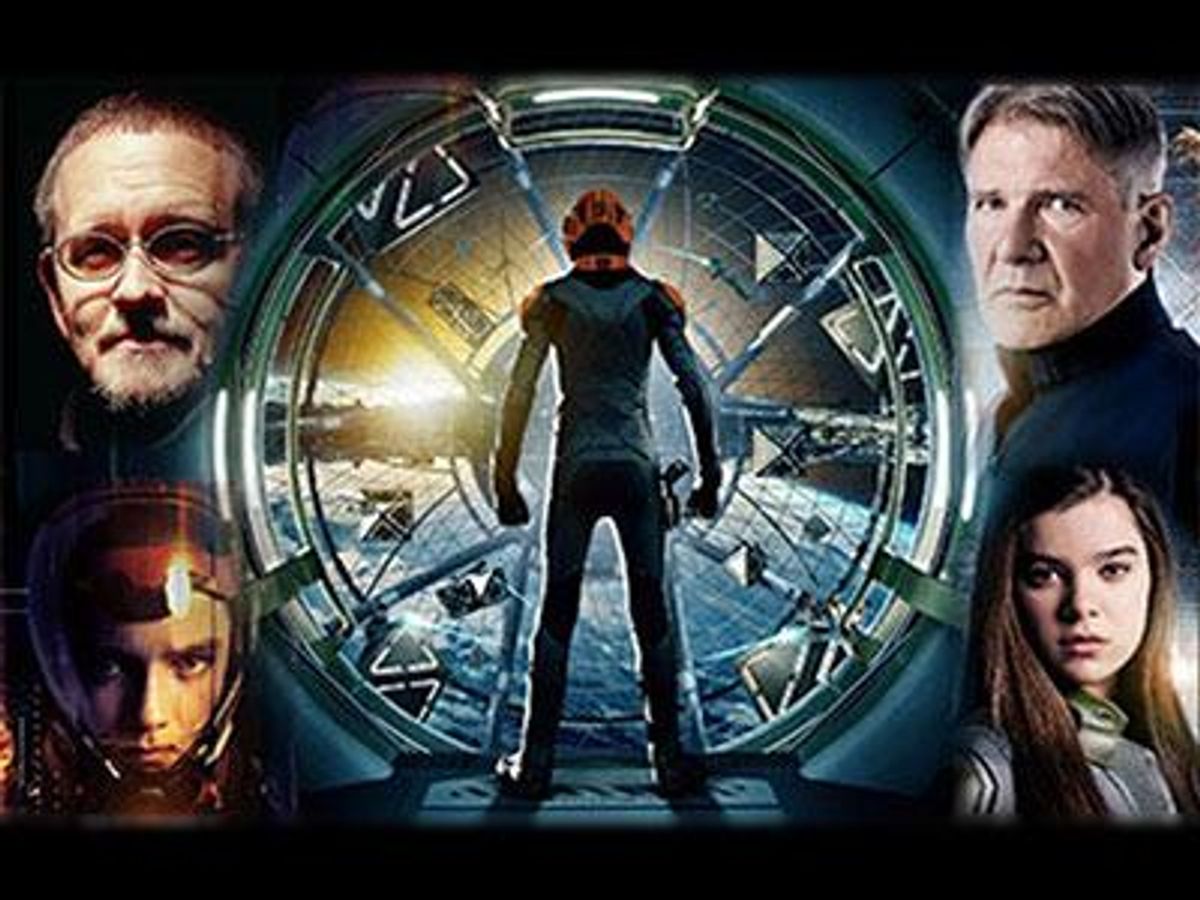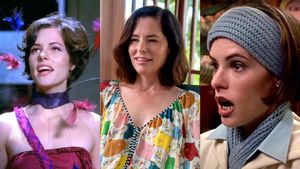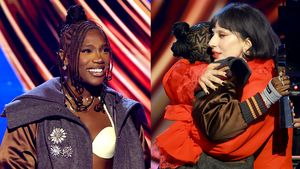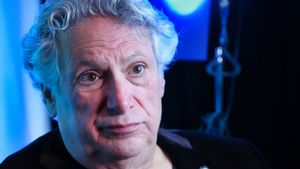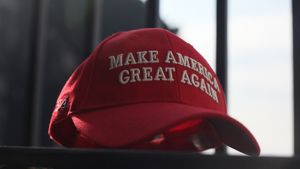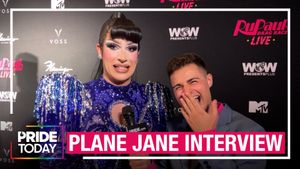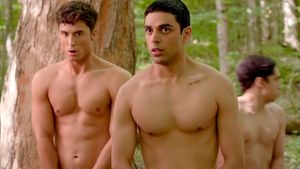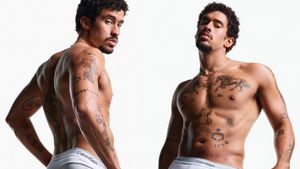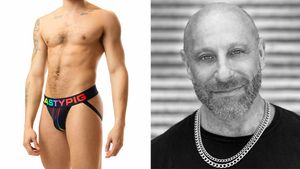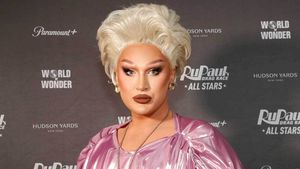I can tell when Harrison Ford is being dead serious. A flirty deadpan quip is a nice warm-up, but when he looks you squarely in the eye with a direct, husky response to your question, he commands serious attention. Ford is on the defensive now, in part because the 1985 classic science fiction novel upon which his new movie is based was written by Orson Scott Card, an antigay activist who until recently was on the board of the National Organization for Marriage.
Card has said some of the vilest things about gay and bisexual people. He thinks my sexual orientation (and yours, if you're queer) is the product of "tragic genetic mixups" and that we may have been raped, molested, or abused into existence.
Ford, who came out to support It Gets Better and marriage equality earlier this year with wife Calista Flockhart (who locked lips with Lucy Liu on Ally McBeal), tells The Advocate that "none of Mr. Card's concerns regarding the issue of gay marriage are part of the thematics of this film, and he has written something I think that is of value to us all ... his views outside of those that we deal with in this film are not an issue for me to deal with, and so I have really no opinion on that issue."
It's important to Ford that Card came out admitting defeat in the wake of the Supreme Court decision on the Defense of Marriage Act. "I think we all know that we've all won," Ford says, "that humanity has won, and I think that's the end of the story."
Not so, says Geeks OUT board member Patrick Yacco. Though he's grateful for the support from cast and crew, and notes that cast members Ford and Abigail Breslin are LGBT allies, Geeks OUT, a group of queer fanboys and fangirls, is holding firm to its call for a boycott of the film, which comes out today.
"Given Card's outspoken activism against LGBT people, we find it necessary to take action and to use this opportunity to raise awareness about his hatred toward queer individuals," says Yacco, who adds that calls for the boycott have earned a "phenomenal" response, including from fans of the novel who are now learning of Card's antigay activities. The Card fiasco has put fans of the legendary young adult novel -- which, in an ironic twist, resonates with many LGBT youth due to its themes of tolerance, empathy, compassion, and difference -- in a quandary: Do they join the boycott because one man among the hundreds involved in the making of the movie is a vile homophobe who called for overthrowing the government if same-sex marriage became widely legal?
Gay screenwriter Dustin Lance Black wrote on his Facebook page: "Boycotting a movie made by 99% LGBT equality folks in an LGBT equality industry is a waste of our collective energy." But the post was flamed by activists and taken down shortly after it was posted, and Black, who was personally lambasted, hasn't released any further statements. LGBT people who admit that they still have plans to see Ender's Game are taking a lot of political risks by crossing that virtual picket line.
Particularly because film distributor Lionsgate is positioning Ender's Game as a tentpole release like Harry Potter or The Hunger Games, Geeks OUT "felt that this was the best opportunity to engage people who may be hearing about Ender's Game and Orson Scott Card for the first time," says Yacco.
But what of the pro-gay cast or the filmmakers, director Gavin Hood and producer Roberto Orci? Hood and Orci are sponsoring this year's Spirit of Courage Awards in Los Angeles in September. Hood is a longtime Courage Campaign member and an outspoken supporter of marriage equality. "I fully understand the position of those seeking a boycott. I really do," says Hood. "What concerns me is that it's dreadfully ironic that Orson wrote a book about compassion and empathy, and yet he himself is struggling to see that his position in real life is really at odds with his art. And, frankly that's not unusual. Great art usually rides above the weaknesses and failings of its creators.
"Neither Bob nor myself, nor any of the producers -- perhaps naively -- anticipated a book that we feel is about compassion and empathy and so on becoming such a flashpoint," he says. "However, we embrace it. We embrace it because it is right to embrace it. And I think it's an important conversation."
Yacco and Hood are both right. Talking about this and taking a stand over a human rights issue is important. The makers of the film and its cast and crew, and probably most people involved in the Ender's Game film, hold views contrary to Card's. We shouldn't penalize them for the idiocy of one man who created the source material nearly three decades ago -- especially given that the message of the film is at odds with that man's own homophobia.
Some media pundits argue that regardless of what happens when the film opens in November, the boycott is already a success. Hollywood insiders, from writers to gamers to movie directors, now see the impact of having someone so outspokenly homophobic on their payroll. The filmmakers are even discussing whether they'd turn down the option to direct and produce future installments, should the film become a franchise. That's pretty powerful stuff. Lionsgate has backed away from Card, and insiders have insinuated that Card's income won't be affected by a boycott, because his producer credit is an honorific and the majority of his fee came years ago when the book was optioned. Orci has asked people to consider the full cost of the boycott to the "667 people" credited in the film and the other thousands who helped who are "gay and straight, male and female, old and young."
This isn't the first time LGBT folks have had to take a side during a boycott. Boycotts have been a part of our American cultural heritage from the 1791 Quaker boycott of sugar produced by slaves to the 1965-1970 Cesar Chavez-led Delano grape boycott. Boycotts by LGBT community groups have had mixed results, though, from the ongoing Chick-fil-A debacle -- visibility of the company's practices is up, but so are Chick-fil-A's sales -- to that of the Salvation Army, which has apparently felt no impact.
The most successful embargo organized by the LGBT community was that of Coors Brewing, which was boycotted from 1973 to 1995 for its antigay hiring policies and stridently homophobic leadership. It was Coors that eventually made changes, and by the mid-'90s it was advertising in LGBT media. I was there, at the helm of a lesbian magazine called Girlfriends, the day the company called, and my office full of activists had to debate for several hours whether to publish a Coors ad (we ultimately did).
In a world where ethical consumerism is sometimes the best way to get our point across, art is a murky zone. Did you watch Chinatown, Rosemary's Baby, or perhaps the queer film Bitter Moon, by director Roman Polanski, the man who raped a 13-year-old? From Mel Gibson, whose hideous anti-Semitic and sexist diatribes are now legendary, to Chris Brown, Cee-Lo Green, O.J. Simpson, Charlie Sheen, Axl Rose, Alec Baldwin, Donna Summer, 50 Cent, Amanda Bynes, and many more, people have committed crimes that range from uttering slurs to rape, battery, and murder. But gay people still routinely watch Airplane! repeatedly, listen to Donna's disco hits, tune into Sheen's surprisingly gay-friendly Anger Management, watch reality TV dominated by Kardashians, and witness Bynes unravel in the tabloids and on PerezHilton.com. Our mouths say boycott, but our TV remotes don't always back that up.
When LGBT activists called for a boycott of Target for donating money to Tom Emmer, a Minnesota politician who had proposed a state constitutional amendment banning same-sex marriage, the company had to point out that it had given even more money to LGBT-friendly politicos and causes. Such is the murky world of corporate politics today that businesses must back both pro-business candidates (often Republicans) and pro-LGBT candidates (often Democrats).
As for Ender's Game, many of my friends will skip it, instead taking part in "Skip Ender's Game" counterprogramming LGBT events that will be held November 1 across the country, some to benefit charities.
I'll be in the theater. I'm going to stand in line, eat bonbons and popcorn, and give a thumbs up or down based on what's on the screen, not who's behind the book. I'll certainly feel a twinge of shame for crossing that invisible picket line (not least because I'm usually on the other side of boycotts). But Ender's Game feels different. That's because I believe in Hood and Orci and the other hundreds of people who aren't Card, and I want to see what they are saying.
Both men say the film -- and the book -- is worth celebrating for its views. Young cast members Breslin and Asa Butterfield are in the crossfire too, says Hood, but "they've handled it with great dignity. ... Young people are smarter than we give them credit for, and none of our cast would endorse the view of Orson Scott Card. ... I think that history is not on his side and I think that young people are way ahead on this issue from their parents, as young people usually are."
DIANE ANDERSON-MINSHALL is an editor at large for The Advocate and editor in chief of HIV Plus magazine. Additional research by JASE PEEPLES.
